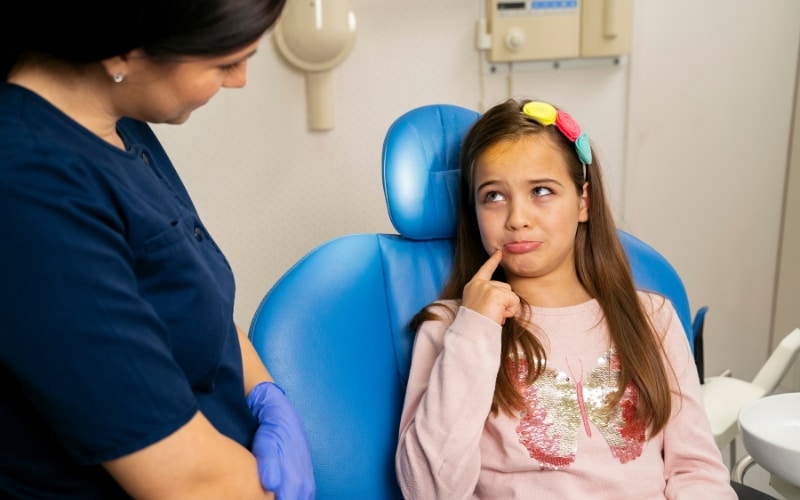ONLINE SCHEDULING AND VIRTUAL CONSULTS AVAILABLE

Baby Bottle Tooth Decay: Prevention and Treatment Strategies

Baby bottle tooth decay, also known as early childhood caries, is a common yet preventable condition that affects the oral health of infants and young children. This dental issue occurs when a child’s teeth are frequently exposed to sugary liquids, such as milk, formula, or fruit juice, often through prolonged bottle-feeding or breastfeeding sessions. Unfortunately, this prolonged exposure to sugars can lead to the rapid decay of the teeth, causing pain, discomfort, and potential long-term complications.
As parents or caregivers, understanding the causes and preventive measures for baby bottle tooth decay is crucial in safeguarding the dental health of our little ones. Not just that, finding the right pediatric dentist in Plantation can play a pivotal role in addressing and preventing baby bottle tooth decay in children. These dental professionals specialize in providing comprehensive care tailored to the unique needs of young patients, offering guidance on proper oral hygiene practices, dietary habits, and preventive treatments.
In this comprehensive guide, we will delve into the various aspects of baby bottle tooth decay, including its causes, signs, prevention strategies, treatment options, and the importance of early intervention. We will explore the essential strategies recommended by top pediatric dentists to protect children from the harmful effects of baby bottle tooth decay, ensuring they develop healthy smiles that last a lifetime.
Causes of Baby Bottle Tooth Decay
Baby bottle tooth decay, a concern often addressed by pediatric dentists, stems from several factors contributing to the deterioration of young children’s dental health:
Prolonged Exposure to Sugary Liquids: One of the primary culprits behind baby bottle tooth decay is the frequent consumption of sugary liquids like milk or juice. When children’s teeth are exposed to these substances for extended periods, especially through bottle-feeding, it increases the risk of tooth decay significantly.
Frequent Bottle or Breastfeeding during Nap or Bedtime: A Pediatric dentist in Plantation emphasizes the importance of avoiding prolonged bottle or breastfeeding sessions, particularly during nap or bedtime. This practice allows sugary liquids to pool around the teeth, promoting bacterial growth and decay.
Poor Oral Hygiene Practices: Inadequate oral hygiene routines, such as infrequent brushing or lack of flossing, can also contribute to baby bottle tooth decay. Without proper cleaning, bacteria and food particles accumulate on the teeth, leading to plaque formation and subsequent decay.
By understanding these factors, parents can work closely with a pediatric dentist in Plantation to implement effective preventive measures and promote their child’s oral health and overall well-being.
Signs and Symptoms of Baby Bottle Tooth Decay
Baby bottle tooth decay may manifest through various signs and symptoms:
Discoloration or Staining of the Teeth: One of the early indicators of baby bottle tooth decay is the appearance of white, brown, or black spots on the teeth. These discolorations often signal the beginning stages of decay and should prompt a visit to the pediatric dentist for evaluation and intervention.
Visible Cavities or Pits on the Tooth Surface: As decay progresses, visible cavities or pits may develop on the surface of the affected teeth. These cavities can vary in size and severity, and their presence indicates the need for prompt dental treatment to prevent further damage and alleviate discomfort.
Pain or Discomfort While Eating or Drinking: Children experiencing baby bottle tooth decay may exhibit signs of pain or discomfort while eating or drinking, especially when consuming hot, cold, sweet, or acidic foods and beverages. This discomfort can interfere with their ability to eat properly and may indicate underlying dental issues that require professional attention.
Recognizing these signs and symptoms is crucial for parents to seek timely intervention from a pediatric dentist in Plantation, ensuring the preservation of their child’s dental health and overall well-being.
Prevention Strategies
To safeguard against baby bottle tooth decay, proactive measures can be taken to promote optimal oral health for infants and toddlers:
Implementing Proper Oral Hygiene Habits from Infancy: Begin cleaning your baby’s gums with a soft, damp cloth or gauze pad after each feeding. As teeth emerge, transition to a soft-bristled toothbrush and fluoride toothpaste in the size of a grain of rice.
Limiting Sugary Drinks and Snacks: Minimize the consumption of sugary liquids, such as fruit juices and sweetened beverages, especially before bedtime. Encourage water as the primary beverage choice and reserve sugary treats for occasional indulgences.
Encouraging Regular Dental Check-ups and Cleanings: Schedule your child’s first dental visit by their first birthday or within six months of the eruption of their first tooth. Regular dental check-ups allow pediatric dentists to monitor oral development, provide preventive care, and offer guidance on oral hygiene practices tailored to your child’s needs.
By incorporating these preventive strategies into your child’s daily routine and seeking guidance from a pediatric dentist in Plantation, you can mitigate the risk of baby bottle tooth decay and lay the foundation for a lifetime of healthy smiles.
Treatment Options for Baby Bottle Tooth Decay
When baby bottle tooth decay occurs, prompt intervention is essential to prevent further damage and restore oral health. Treatment options may include:
Dental Fillings for Cavities: If decay has progressed to the point of cavity formation, your pediatric dentist may recommend dental fillings to restore the affected teeth. Composite resin or amalgam fillings are commonly used to repair cavities and protect the tooth from additional decay.
Fluoride Treatments to Strengthen Tooth Enamel: Fluoride treatments can help strengthen weakened tooth enamel and reverse the early stages of decay. Your dentist may apply fluoride varnish or gel directly to the affected teeth during a dental visit to promote remineralization and enhance their resistance to acid attacks.
Extraction of Severely Decayed Teeth: In cases of extensive decay or when a tooth is severely damaged beyond repair, extraction may be necessary to prevent infection and preserve overall oral health. Your pediatric dentist will evaluate the extent of decay and recommend extraction if deemed appropriate.
By addressing baby bottle tooth decay promptly and exploring treatment options with your pediatric dentist, you can safeguard your child’s oral health and promote a healthy smile for years to come.
Baby bottle tooth decay is a preventable yet concerning condition that can impact a child’s oral health and overall well-being. By understanding the causes, signs, and prevention strategies outlined in this guide, parents and caregivers can take proactive steps to protect their child’s teeth from decay and promote a lifetime of dental health. Remember, regular visits to a pediatric dentist in Plantation are crucial for early detection and intervention, ensuring that any potential dental issues are addressed promptly and effectively. With proper care and guidance, you can help your child enjoy a healthy smile and a bright future.




